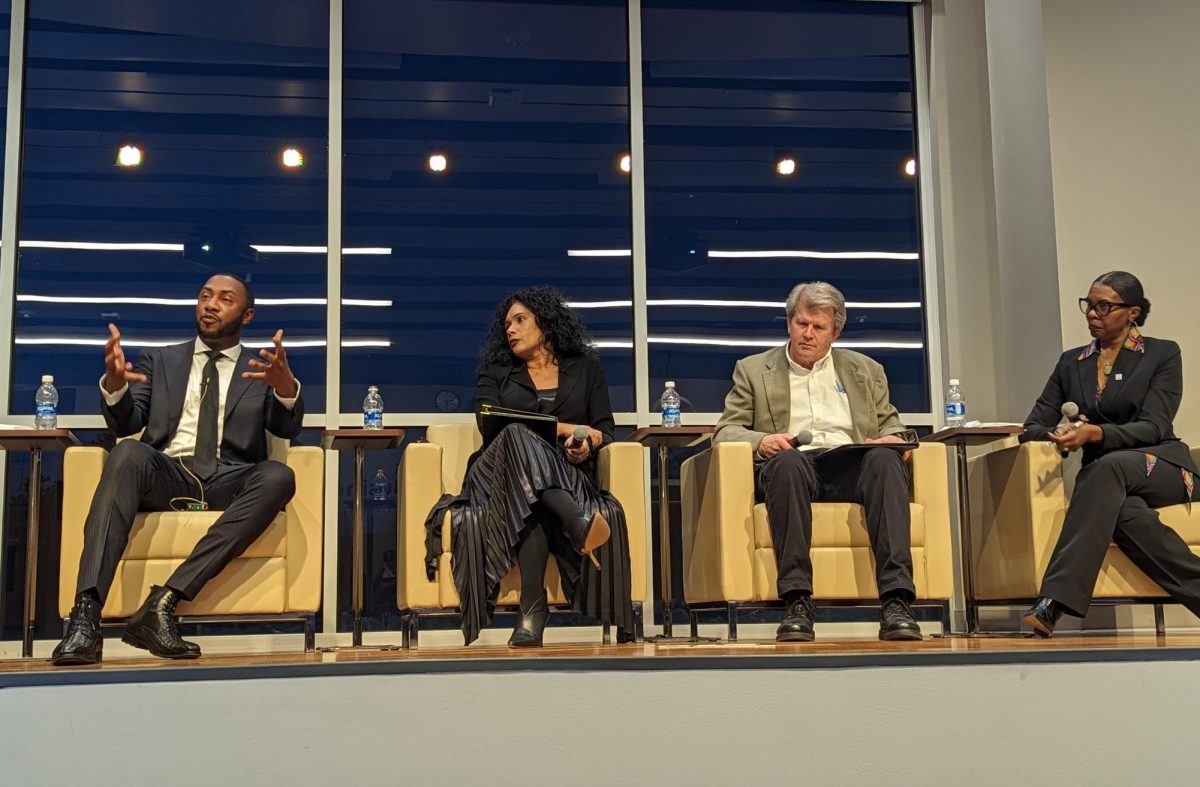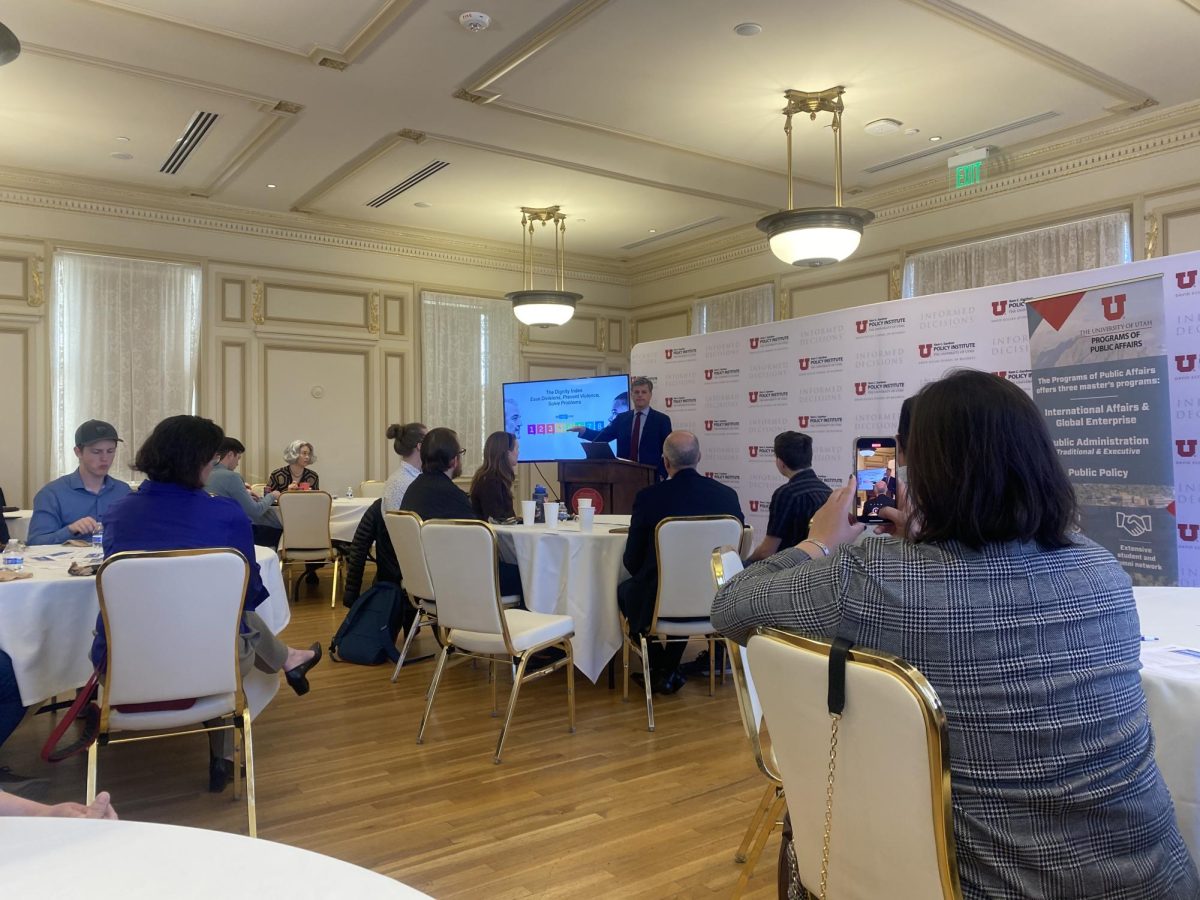
Pictured is Lisa Cannon-Albright, professor and the chief of the Division of Genetic Epidemiology in the Department of Medicine at the U.)
Most of the men at the U are young and carefree, but it’s never too early to look at their family history for prostate cancer because it may benefit them in the future.
Since the 1970s, Lisa Cannon-Albright, a professor and chief of the Division of Genetic Epidemiology in the U’s Department of Medicine, has been diving into genetic cancer research. Now, after about 30 years, Cannon-Albright and her research partners, including Robert Stephenson, doctor at the Huntsman Cancer Institute and professor of urology at the School of Medicine, have published a paper on their findings on prostate cancer. They found an alternative to unnecessary toxic treatment and screen testing for prostate cancer — looking at genetics.
“I have had this idea for a long time, that we could use genealogy to estimate individualized risks in people for cancer,” Cannon-Albright said. “This study design can be very powerful if there is something, a treatment, to be done by the risk discovered.”
The prostate is a small gland in the male body that aids the reproductive system. With help from the Huntsman Cancer Institute, the Veterans Medical Center in Salt Lake City and Mark Skolnik’s genetic database MYRIAD, Cannon-Albright has studied countless numbers of genetic pedigrees and patterns in genes that show cancer risks. She and Stephenson found that prostate risks are high in Utah families and that collecting genealogy from men who are at risk for prostate cancer could help determine whether or not new generations are likely to develop problems as well.
“This study shows some interesting things,” Stephenson said. “Many patients have used the wrong treatments, so we have been looking for alternative approaches. Family history is reasonably informative.”
The research has not only broadened genetic horizons but has also assessed the accuracy of screening for prostate and other cancers. Cannon-Albright said screening for prostate cancer is unreliable, and many men die with their cancer undiagnosed or not treated sufficiently. With knowledge of their background and more advanced screening, however, patients are more likely to know their risk before the cancer advances.
With the clinical assistance of Stephenson, it has also been shown that having genetic information on families for generations can assist in predicting whether or not one may develop the cancer and to how severe of an extent, so they can treat it correctly. He said many patients in clinics undergo unnecessary and toxic treatments.
“Men have received treatment that they do not need,” Stephenson said. “We want to make the punishment fit the crime.”
The importance of the genetic research stems from the accuracy to determine the potential one has of developing prostate cancer advanced enough to kill. Though screening can show prostate cancer, it cannot predict nor produce information on the deadliness of the cancer. Assisting Cannon-Albright and other members of the research team, Stephenson thinks that genetic information will refine the numbers of patients who need extreme treatment and those who do not.
“One approach to decide on treatments is to look at a man’s family history,” Stephenson said. “That will help us decide on the treatment of the cancer and who we should be looking for cancer in.”
To make a correct diagnosis and find an accurate treatment, research has now begun to focus on fourth-degree relatives. First-degree relatives have been known to pass on the cancer, but the idea that a fourth-degree relative could is fairly new. A first-, second- or third-degree relative could be one’s grandfather, great-grandfather, cousin, uncle, half-sibling, etc. The fourth-degree is even more distant, such as a half-brother’s cousin.
“There’s enough people with second- and third-degree relatives who had prostate cancer that we can estimate their risk,” Cannon-Albright said. “With genetic history, everybody with the risk would then know.”
Being able to use many Utah families as examples, Cannon-Albright was able to take her genetic research to another level. Her research team is able to link Utah genealogy with a state-wide genetic cancer database, creating a mega-database called UPDB. Cannon-Albright has taken it under her wing to work with the administration to build a national genealogy, too.
In the Utah database, specifically, she’s been able to follow people’s ancestry that descended from the original pioneers to the state. This links patients to their ancestors with prostate cancer even further and enriches the UPDB data.
“In the future we would like to use more databases to make this more universal to evaluate risks for other and all populations,” Cannon-Albright said.
She found through her use of genetic pedigrees that most of the men with high prostate risks in Utah are descendants of northern European backgrounds. This is a trend that holds true nation-wide.
Utah may have a big population, but in order to be a national effort, more families must be studied. To begin her outreach, Cannon-Albright has focused on patients at the VA — veterans and members of the military. She has done this because of the military’s genealogical records and to extend her research to families outside of Utah.
“The general idea I have is that family history information is free, so this is a modern medicine tool that is equally available to everybody,” she said.
This information took years to gather numbers sufficient enough to show the validity of its potential use. Cannon-Albright initially published her work in a paper in 2010. The data behind the early research was successful enough that she has moved on to other cancers as well, such as colorectal cancer, and has promoted its use behind breast cancer research.
With Albright on the genetic research side of the collaboration, Stephenson on the clinical side and the aide of others, this data has come together. Both Cannon-Albright and Stephenson are looking toward the future in helping men with prostate cancer risks and hope that their research will contribute to those after them.
“When you have people working together, you get a richer product,” Stephenson said. “Humankind-related problems are complicated now, and we need many perspectives to solve them.”
@chriswritine





















